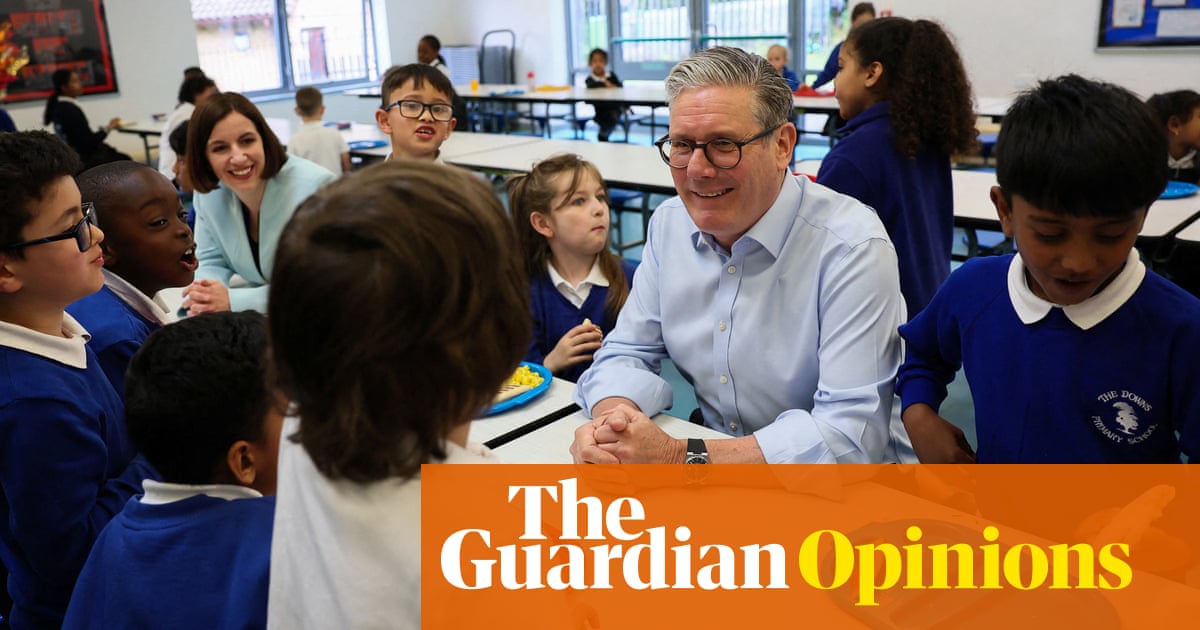Good news. Free school meals for all children in England on universal credit is rightly being celebrated by schools, nurseries, further education colleges and children’s charities. There may only be 500,000 extra recipients estimated by the government now, but in the long run 1.7 million children will be eligible,says the Institute for Fiscal Studies. “Fantastic news,”says the Child Poverty Action Group(CPAG), as 100,000 children will be lifted out of poverty by this annual £500 put back in parents’ pockets.
Food matters. Hungry children can’t learn, and many miss school to avoid the public embarrassment of no dinner money and no packed lunch,according to CPAG’sPriced Out of School report. Strong evidence shows a rise in attainment and attendance if you feed children.The Feed the Future campaign findsnot just academic achievement but health, happiness, reduced obesity and lifetime earnings improve if children don’t go hungry. Surely that can’t surprise anyone.
The universal breakfast clubs being rolled out now represent real progress. Strict rules stopping schools from demanding absurdly expensive uniforms, sometimes a not-so-subtle way to exclude poorer families, is another part of a developing anti-poverty strategy.
But it’s complicated. Nothing in poverty numbers is easy. So while celebrating more meals for more children, we should question the total number of children lifted out of poverty. The government says it’s 100,000 and the IFS agrees. But look what happens when you factor in the dire effect of the upcoming £5bn disability and Pip cuts. Turn to the government’s own paper on the impact.Look at Annex B: “It is estimated that there will be an additional 250,000 people (including 50,000 children) in relative poverty after housing costs in financial year ending 2030 as a result of the modelled changes to social security.”
As those receiving support from sources such as Pip lose their benefit, the family gets poorer. Some may find this offset by the addition of free school meals, but not all will qualify, and many families will still find themselves worse off once what they gain from having free school meals is set against benefit losses.
The vote on disability benefit cuts is coming up shortly, with up to 170 Labour MPs reportedly ready to rebel. As the Department for Work and Pensions scurries toamend the proposalin time for the vote, it needs to take into account the danger of sending more children below the poverty threshold.
Of the many severe critiques of the government’s Pathways to Work plan for these disability cuts, one of the most authoritative is theCitizens Advice response, Pathways to Poverty. It opens: “By refusing to properly consult on its plan to cut billions from disability benefits, the government is choosing not to ask questions it doesn’t want the answers to. The cuts will have a devastating impact on disabled people (and their children), sending hundreds of thousands into poverty, and many more into deeper poverty. This will result from a series of arbitrary reforms that have been designed around savings targets rather than improving outcomes, inflicting hardship on people in ways that the government doesn’t yet fully understand.”
Few would doubt the need for the government to take action on the growing numbers of working-age people off sick with mental and physical ailments. Good plans to provide work coaches to help, not bully, them back into working life with an array of supports are unfolding. But the dash for cash suddenly and unexpectedly imposed on the DWP at the last moment when the Office for Budget Responsibility found a gap in Reeves’s proposed £5bn in savings has thrust more brutal cuts forward, regardless of circumstance. In 1997, New Labour’s New Deal to help people into work was a great success: money saved came from finding people jobs, not cutting their benefits in advance, something that was likely to reduce their work capability.
The welcome new free school meals policy shines a light on the depths of poverty. How could the appallingly low family income of £7,400 have been the qualifier until now? In Northern Ireland the benchmark is twice as high. Wales and London have universal free meals for primary children; in Scotland, all pupils are eligible for the first five years of primary school. Labour inherited a tax and benefits system that had, since 2010, cut entitlements among families with children by £2,200 a year on average, with those out-of-work losing £5,500 a year,reports the IFS. Reversing that is an uphill task.
Many children now getting free meals won’t be lifted out of poverty: it would take a lot more than £500 a year. Lifting the two-child cap would cost less than meals, in terms of freeing children from poverty. That estimated£3.5bn to abolish itwill have to be found by Liz Kendall and Bridget Phillipson’s child poverty taskforce, which will report at budget time in the autumn. There just is no way round it for a government that pledged to take more children out of poverty. Note that they call this free school meals announcement just a “down payment”. The best had better be yet to come.
A final thought: for all the panic about disability claims, total working-age benefits as a proportion of government spending havenot risen in the past 20 years. What has happened is cuts for children have been offset by increases for triple-locked pensioners.
Polly Toynbee is a Guardian columnist
